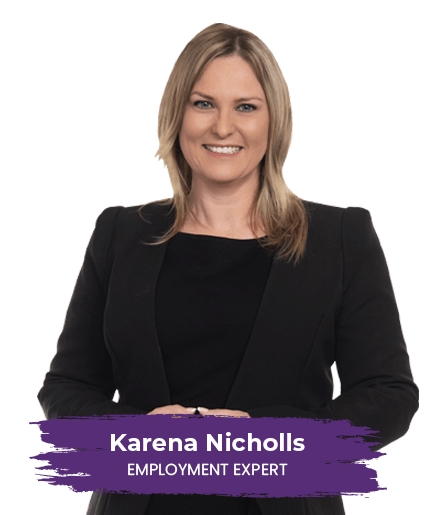We’ve Got You Covered
We recognise the critical importance of addressing sexual harassment in the workplace, especially for employers. Our legal experts provide knowledgeable guidance and proactive strategies to help employers understand and fulfill their obligations in preventing and responding to sexual harassment. We are committed to fostering safe and respectful work environments, offering comprehensive advice on policy development, training, and effective incident management.

Karena Nicholls
Partner
Book Your Sexual Harassment Obligations Consultation Now
What is Sexual Harassment at Work?
- Unwelcome conduct of a sexual nature in relation to a person.
- It occurs where a reasonable person would anticipate the possibility of the person who is harassed being offended, humiliated or intimidated.
- Conduct includes making a statement of a sexual nature in front of or to a person. It can also be made in writing.
- Workplace sexual harassment does not need to occur several times for it to be harassment, it can occur as a one-off incident.
- Sexual harassment can include:
- Inappropriate staring, leering or loitering.
- Unwelcome touching.
- Suggestive comments or jokes, insults or taunts, based on sex, or sexual gestures.
- Using suggestive or sexualised nicknames for a person.
- Persistent unwanted invitations to go out on dates.
- Intrusive questions or comments about a person’s private life or body.
- Unnecessary familiarity, such as deliberately brushing up against a person.
- Displaying material of a sexual nature in the workplace.
- Communicating sexually explicit material in person or through phone calls, online interaction, email, social media or text messages.
Governing Legislation – harassment occurred on or after March 6 2023
- Part 3-5A of the Fair Work Act prohibits sexual harassment in connection with work.
Responding to an Application as an Employer
- The Commission will send a copy of the application made by the employee to any individuals named and the employer of the worker.
- You can respond to the application using Form F77 – Response from Employer to an Application to Deal with a Sexual Harassment Dispute.
- The form should be completed and returned within 7 days.
- It is important to note that employers may be liable for the conduct of their employees and agents.
Objecting to an Application
- Employers can object to the application if they do not believe it appropriate for the Commission to deal with the dispute. Reasons for this may include:
- The aggrieved person was not a worker, or seeking to become a worker, in the business where the alleged harassment occurred.
- The aggrieved person was not conducting a business or undertaking when the alleged sexual harassment happened.
- The applicant is not an industrial association that is entitled to represent the industrial interests of an aggrieved person.
- The aggrieved person is a member of the Defence Force.
- The application might involve matters relating to Australia’s defence or national security, or an existing or future covert or international operation of the Australian Federal Police.
- The conduct described in the application does not meet the definition of sexual harassment.
- The alleged sexual harassment did not happen in connection with work.
- The alleged sexual harassment occurred (or was part of a course of conduct that commenced) before 6 March 2023 and therefore should be made under the transitional arrangements in the Secure Jobs, Better Pay Act.
- The alleged sexual harassment happened more than 24 months before the application was made.
- There is another application or complaint under anti-discrimination law or the Australian Human Rights Commission Act 1986 about the same conduct.
- The application is frivolous or vexatious.
- The application has no reasonable chance of success.
- The application is for an order to stop sexual harassment only and the aggrieved person is no longer connected to the workplace such that there is no risk of continued sexual harassment.
Outcomes
- If the conduct occurred on or after 6 March 2023, once an application is received, commonly, the Commission will hold a Member Conference as the first step.
- If the application does not settle at a Member Conference, the next steps will depend on the nature of the application. If the aggrieved person:
- Seeks orders to stop sexual harassment in connection with work; or
- Has asked the Commission to deal with the dispute and the Commission has issued a certificate, a determinative conference, hearing or arbitration may be held.
- If the conduct occurred before 6 March 2023:
- The Commission will assess the application and any responses or objections to decide the next steps.
- Some cases will start with conciliation. If successful, both sides will reach an agreement and the case ends.
- Some cases will go straight to a Commission Member, who will then decide the best process for dealing with the case. This could include a conciliation, conference or formal hearing.
- The Commission will try to resolve the matter within 16 weeks of receiving the application.
- If the case does not settle, you may need to attend a conference or hearing with a Commission Member. You should prepare by printing out and reading all documents relevant to the case.
- After the hearing, the Commission Member will make a decision about the outcome.
- Parties are given the opportunity to appeal the decision or order.
Employer Protections
To protect against sexual harassment in the workplace, employers should have the following in place:
Systems
- Establish workplace policies that clearly explain what sexual harassment is.
- Have clear policies for acceptable workplace communications and behaviours, including person-to-person, email, telephone and social media.
- Have clear policies and procedures for work-related events.
Training
- Include effects of harmful workplace behaviour in workplace health and safety training.
- Provide workers at all levels with clear information on the process for reporting and investigating incidents of sexual harassment.
- Provide training for staff on undertaking workplace investigations relating to incidents of sexual harassment.
- Ensure staff are appropriately supervised.
Intervene as soon as possible
- Encourage accountability and call out harmful behaviour immediately.
- Develop processes in consultation with staff, encouraging early reporting and provision of support.
- Ensure access to information, policies and procedures for those who have experienced sexual harassment at work.
Implement Reporting and Response Processes
- Provide accessible and confidential reporting processes.
- Establish clear guidelines for those responsible for responding to or investigating reports of sexual harassment.
- Respect the confidentiality of information.
- Provide feedback in a timely manner.
What to Expect with Coutts Lawyers
Step 1: Initial Contact
Reach out to Coutts Lawyers via our website, phone, or in person. Briefly describe your matter.
Step 2: Consultation Appointment
Schedule and attend a meeting with a Coutts lawyer / Conveyancer to discuss the specifics of your matter and desired outcomes.
Step 3: Information & Legal Advice
Share all related documents and information. Your lawyer / Conveyancer will review everything, clarify aspects as needed, and then advise on the best action course.
Step 4: Action Plan Development
Based on the advice, an appropriate action plan will be formulated. This may involve communication, documentation processes, or further legal steps.
Step 5: Implementation
Execute the action plan, addressing a range of legal scenarios as necessary.
Step 6: Resolution & Closure
Navigate towards a resolution, with the path determined by the nature of the matter. Your Lawyer / Conveyancer will outline any final actions or considerations.
Book Your Sexual Harassment Obligations Consultation Now
Introducing Karena
Your Compassionate Lawyer.
Meet Karena, a Partner at Coutts Lawyers & Conveyancers, and the head of our esteemed Injury Compensation and Employment Law teams. With over two decades of experience in the field of Insurance Law, Karena’s passion, dedication, and client-focused approach have established her as a leading authority in compensation and employment law.


Connect with Karena Today
Multi Award-Winning
Law Firm

Sexual Harassment Obligations FAQ’s
Sexual harassment in the workplace is defined as any unwelcome conduct of a sexual nature. This can include a range of behaviours, from verbal comments and jokes to physical actions like touching or leering. It’s not limited to direct interactions either; it can also involve displaying offensive material or sending inappropriate messages. The key aspect is that the behaviour is uninvited and makes the recipient feel uncomfortable, offended, or intimidated. It’s important to remember that what constitutes sexual harassment can vary based on individual perceptions and context, and it’s not always about the intent of the person exhibiting the behaviour but how it is received by the person on the receiving end.
Yes, sexual harassment does not need to be a repeated or ongoing behaviour to be considered harassment. Even a single incident, if it’s of a sexual nature and unwelcome, can constitute sexual harassment. This might include a one-time comment, gesture, or any form of physical contact that is inappropriate and makes the person on the receiving end feel harassed. The seriousness of sexual harassment is judged by how the conduct affects the individual and whether a reasonable person would find it offensive. It’s essential for workplaces to recognise and address even isolated incidents, as they can significantly impact an individual’s well-being and workplace environment.
If you experience sexual harassment at work, it’s important to know that there are steps you can take to address the situation. Firstly, if you feel comfortable and safe doing so, you may directly inform the person that their behaviour is unwelcome and ask them to stop. However, if direct communication is not safe or comfortable, or if the behaviour continues, you should report the incident to your supervisor, human resources department, or any designated personnel within your organisation. Most workplaces have specific procedures for handling sexual harassment complaints, which typically include a confidential process for filing a report and an investigation. Remember, it’s crucial to document the incidents as much as possible, including dates, times, places, and the nature of the behaviour, as this information can be vital during any investigation. Your workplace should take your complaint seriously, ensure your safety, and take appropriate action to address the harassment.
Download your FREE Employment Law Guide!



